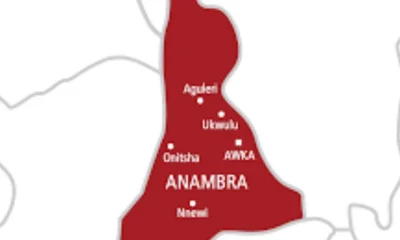HEALTH
Lack of Funds Hindering Tuberculosis Control in Anambra – Agency

Dr. Ugochukwu Chukwulobelu, the manager of the Anambra State Tuberculosis, Leprosy, and Buruli Ulcer Control, has highlighted that insufficient funding is hampering efforts to address the growing incidence and prevalence of tuberculosis in Anambra State.
Chukwulobelu made this known during a one-day ‘Consultative Breakfast Meeting on Tuberculosis’ with the private sector and other stakeholders in Awka on Saturday. The event was organized by the Gender Perspective and Social Development Centre as part of its Fund TB Project in Anambra State, which is implemented by five non-governmental organizations across the South-East and South-South regions. The project is funded by USAID through the Palladium Group under its Strengthening Civic Advocacy and Local Engagement initiative.
Chukwulobelu expressed concern that despite tuberculosis being a major public health challenge, the response to it has largely depended on donor funding. He stated, “323 out of every 100,000 people have TB, and we see 219 new TB cases per 100,000 annually. The core issue is funding. If adequate funds were available, sustainability would be ensured even as donor support wanes.”
He further lamented the lack of financial support from the government, saying, “Despite numerous memos sent last year, none were approved, and no funds were released from the budgeted amount. Anambra State has around 800 DOT sites, 14 Gene Xpert machines, 13 Gene Xpert sites, and 1 Truenat machine, among others, which have significantly improved access to treatment.”
Chukwulobelu also clarified that a tuberculosis patient undergoing treatment for a week is not capable of infecting others, stressing the importance of understanding this to reduce the stigma associated with the disease. He emphasized that diagnosis and treatment for tuberculosis are free in Anambra State and urged private sector involvement to bridge the significant funding gap.
Chima Asomba, a civil society activist, reiterated the need for private sector engagement in tuberculosis eradication, noting the transparency and accountability in Anambra State’s TB control program. She encouraged investment in DOT facilities, diagnostic tools, and education to enhance TB response, particularly in underserved areas like Awka North and Orumba North.
Eucharia Anekwe, Executive Director of GPSDC, echoed this sentiment, suggesting that businesses incorporate anti-TB messages into their promotional materials and support TB patients with nutritious food, transportation, and outreach programs.
In a presentation on Transformative Budgeting and Financing for Improved Tuberculosis Services in Nigeria, Faith Paulinus, Head of Monitoring, Evaluation, and Learning at Fund TB Cluster, called on the Anambra State Government to demonstrate greater commitment by increasing domestic budget allocations and releases for TB control. She also urged the private sector to integrate TB efforts into their corporate social responsibility initiatives, such as acquiring GeneXpert machines and subsidizing TB diagnosis while raising workplace awareness about the disease.
The State TB Network Coordinator, Ify Unachukwu, emphasized the importance of separate funding for different health programs, advocating for a clear annual budget allocation for each program instead of combining all health-related funds.



















You must be logged in to post a comment Login